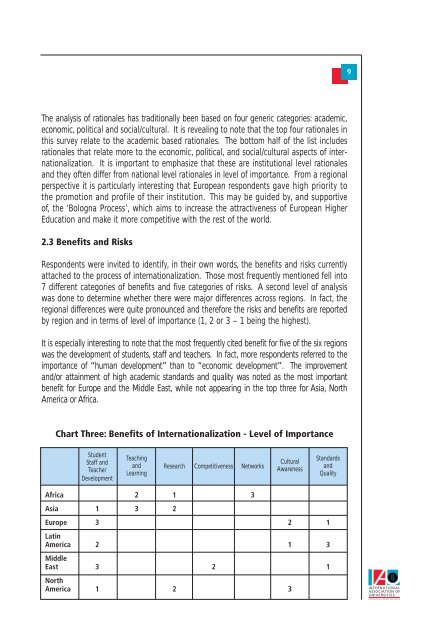Executive summary - IAU 1st Global Survey (2003)
You also want an ePaper? Increase the reach of your titles
YUMPU automatically turns print PDFs into web optimized ePapers that Google loves.
9<br />
The analysis of rationales has traditionally been based on four generic categories: academic,<br />
economic, political and social/cultural. It is revealing to note that the top four rationales in<br />
this survey relate to the academic based rationales. The bottom half of the list includes<br />
rationales that relate more to the economic, political, and social/cultural aspects of internationalization.<br />
It is important to emphasize that these are institutional level rationales<br />
and they often differ from national level rationales in level of importance. From a regional<br />
perspective it is particularly interesting that European respondents gave high priority to<br />
the promotion and profile of their institution. This may be guided by, and supportive<br />
of, the ‘Bologna Process’, which aims to increase the attractiveness of European Higher<br />
Education and make it more competitive with the rest of the world.<br />
2.3 Benefits and Risks<br />
Respondents were invited to identify, in their own words, the benefits and risks currently<br />
attached to the process of internationalization. Those most frequently mentioned fell into<br />
7 different categories of benefits and five categories of risks. A second level of analysis<br />
was done to determine whether there were major differences across regions. In fact, the<br />
regional differences were quite pronounced and therefore the risks and benefits are reported<br />
by region and in terms of level of importance (1, 2 or 3 – 1 being the highest).<br />
It is especially interesting to note that the most frequently cited benefit for five of the six regions<br />
was the development of students, staff and teachers. In fact, more respondents referred to the<br />
importance of “human development” than to “economic development”. The improvement<br />
and/or attainment of high academic standards and quality was noted as the most important<br />
benefit for Europe and the Middle East, while not appearing in the top three for Asia, North<br />
America or Africa.<br />
Chart Three: Benefits of Internationalization - Level of Importance<br />
Student<br />
Staff and<br />
Teacher<br />
Development<br />
Teaching<br />
and<br />
Learning<br />
Research Competitiveness Networks<br />
Cultural<br />
Awareness<br />
Standards<br />
and<br />
Quality<br />
Africa 2 1 3<br />
Asia 1 3 2<br />
Europe 3 2 1<br />
Latin<br />
America 2 1 3<br />
Middle<br />
East 3 2 1<br />
North<br />
America 1 2 3





